Challenges and Best Practices: Food Industry Ethics and Sustainability
VerifiedAdded on 2020/11/12
|12
|3788
|335
Report
AI Summary
This report provides a comprehensive analysis of business ethics, corporate responsibility, and sustainability within the food industry. It begins with an introduction to business ethics and its relevance to food production and consumer safety. The report identifies key challenges faced by the food industry, including food safety and integrity, environmental concerns, workplace issues, and community impacts. It examines best practices in the food manufacturing sector, focusing on water management, health and safety, and food safety protocols. The report also offers recommendations for companies to enhance their ethical and sustainable practices, emphasizing the importance of robust governance, employee engagement, and environmental initiatives. Finally, the report underscores the significance of corporate social responsibility in driving long-term growth and protecting the reputation of food industry businesses. This report is a valuable resource for students studying business ethics and related fields, offering insights into the complex interplay of ethical considerations and practical applications within the food industry.
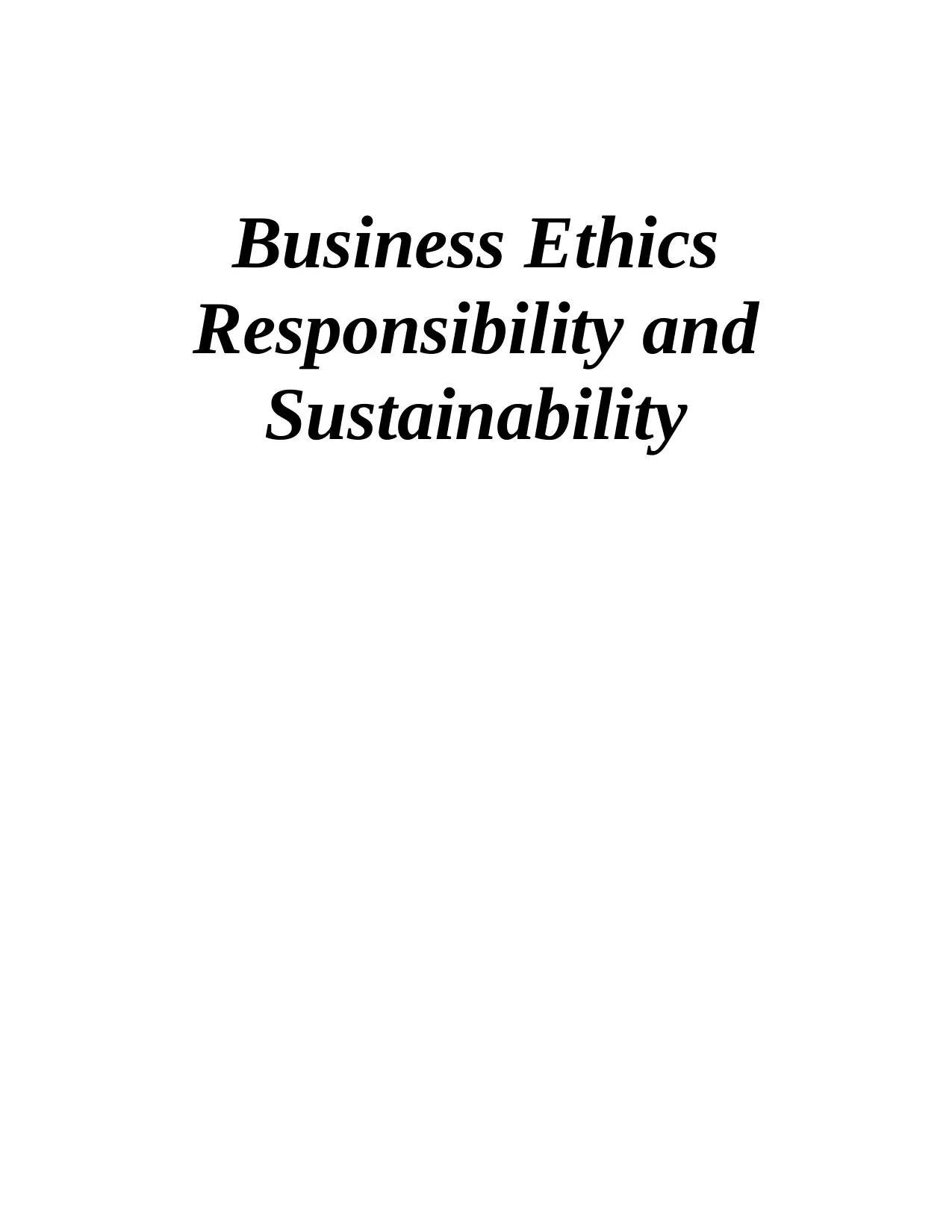
Business Ethics
Responsibility and
Sustainability
Responsibility and
Sustainability
Paraphrase This Document
Need a fresh take? Get an instant paraphrase of this document with our AI Paraphraser
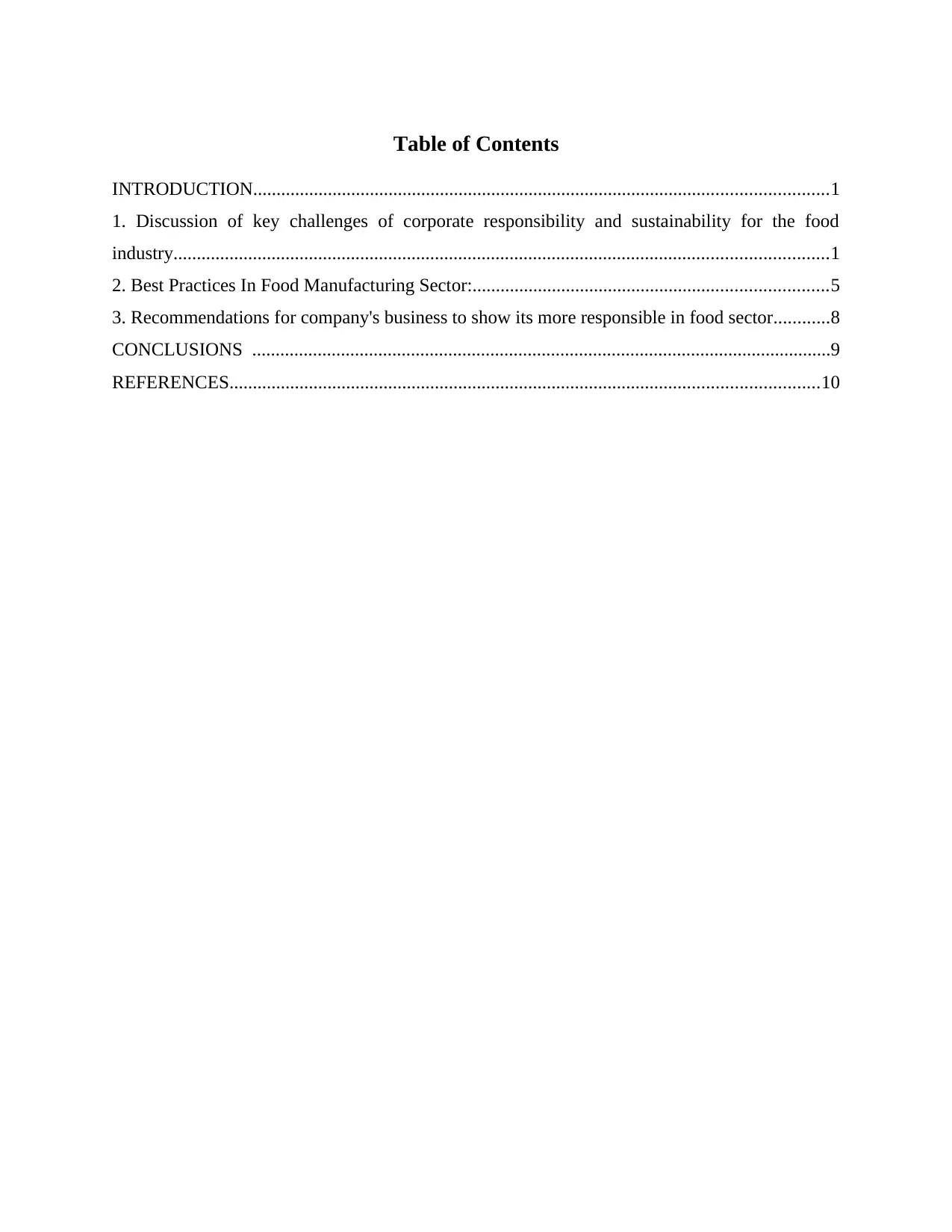
Table of Contents
INTRODUCTION...........................................................................................................................1
1. Discussion of key challenges of corporate responsibility and sustainability for the food
industry............................................................................................................................................1
2. Best Practices In Food Manufacturing Sector:............................................................................5
3. Recommendations for company's business to show its more responsible in food sector............8
CONCLUSIONS ............................................................................................................................9
REFERENCES..............................................................................................................................10
INTRODUCTION...........................................................................................................................1
1. Discussion of key challenges of corporate responsibility and sustainability for the food
industry............................................................................................................................................1
2. Best Practices In Food Manufacturing Sector:............................................................................5
3. Recommendations for company's business to show its more responsible in food sector............8
CONCLUSIONS ............................................................................................................................9
REFERENCES..............................................................................................................................10
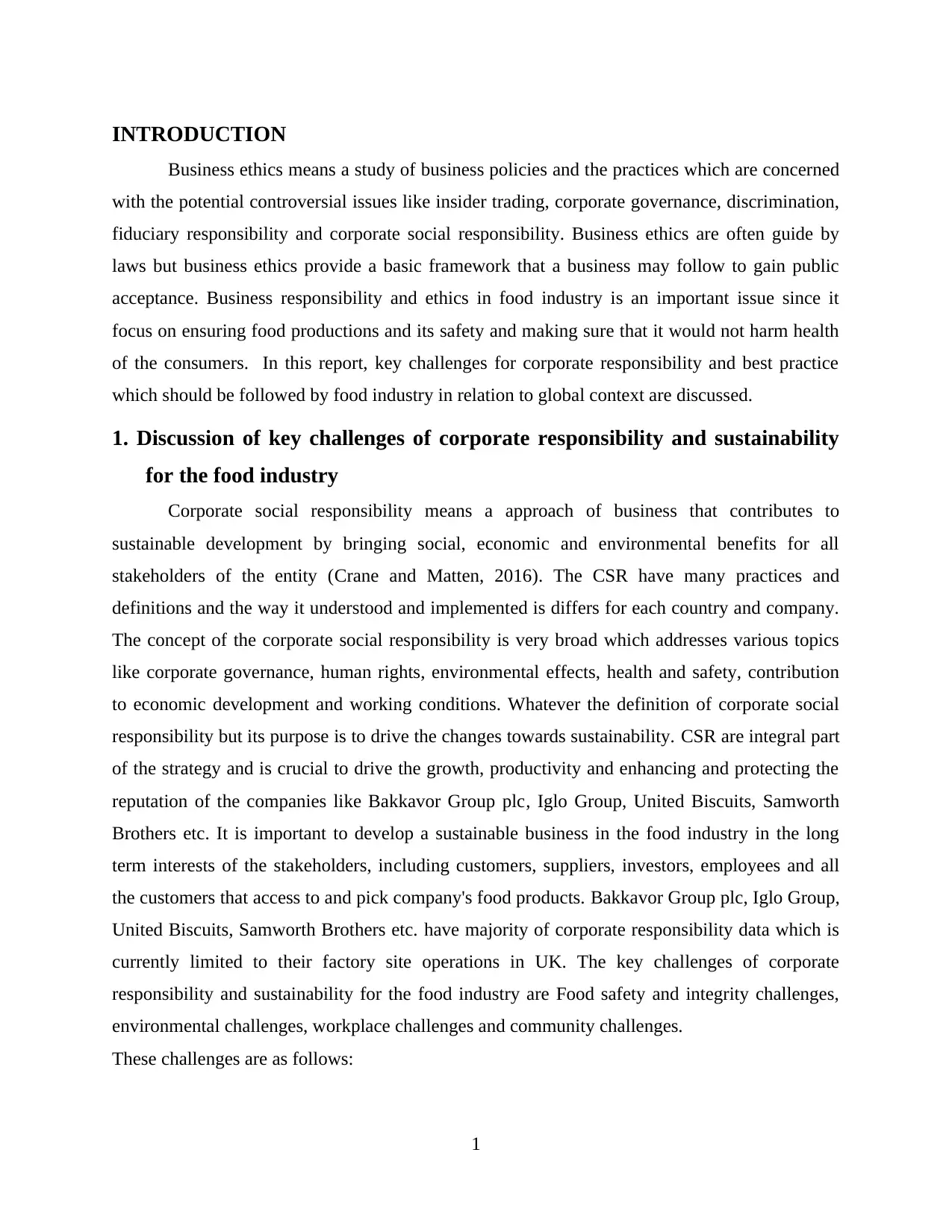
INTRODUCTION
Business ethics means a study of business policies and the practices which are concerned
with the potential controversial issues like insider trading, corporate governance, discrimination,
fiduciary responsibility and corporate social responsibility. Business ethics are often guide by
laws but business ethics provide a basic framework that a business may follow to gain public
acceptance. Business responsibility and ethics in food industry is an important issue since it
focus on ensuring food productions and its safety and making sure that it would not harm health
of the consumers. In this report, key challenges for corporate responsibility and best practice
which should be followed by food industry in relation to global context are discussed.
1. Discussion of key challenges of corporate responsibility and sustainability
for the food industry
Corporate social responsibility means a approach of business that contributes to
sustainable development by bringing social, economic and environmental benefits for all
stakeholders of the entity (Crane and Matten, 2016). The CSR have many practices and
definitions and the way it understood and implemented is differs for each country and company.
The concept of the corporate social responsibility is very broad which addresses various topics
like corporate governance, human rights, environmental effects, health and safety, contribution
to economic development and working conditions. Whatever the definition of corporate social
responsibility but its purpose is to drive the changes towards sustainability. CSR are integral part
of the strategy and is crucial to drive the growth, productivity and enhancing and protecting the
reputation of the companies like Bakkavor Group plc, Iglo Group, United Biscuits, Samworth
Brothers etc. It is important to develop a sustainable business in the food industry in the long
term interests of the stakeholders, including customers, suppliers, investors, employees and all
the customers that access to and pick company's food products. Bakkavor Group plc, Iglo Group,
United Biscuits, Samworth Brothers etc. have majority of corporate responsibility data which is
currently limited to their factory site operations in UK. The key challenges of corporate
responsibility and sustainability for the food industry are Food safety and integrity challenges,
environmental challenges, workplace challenges and community challenges.
These challenges are as follows:
1
Business ethics means a study of business policies and the practices which are concerned
with the potential controversial issues like insider trading, corporate governance, discrimination,
fiduciary responsibility and corporate social responsibility. Business ethics are often guide by
laws but business ethics provide a basic framework that a business may follow to gain public
acceptance. Business responsibility and ethics in food industry is an important issue since it
focus on ensuring food productions and its safety and making sure that it would not harm health
of the consumers. In this report, key challenges for corporate responsibility and best practice
which should be followed by food industry in relation to global context are discussed.
1. Discussion of key challenges of corporate responsibility and sustainability
for the food industry
Corporate social responsibility means a approach of business that contributes to
sustainable development by bringing social, economic and environmental benefits for all
stakeholders of the entity (Crane and Matten, 2016). The CSR have many practices and
definitions and the way it understood and implemented is differs for each country and company.
The concept of the corporate social responsibility is very broad which addresses various topics
like corporate governance, human rights, environmental effects, health and safety, contribution
to economic development and working conditions. Whatever the definition of corporate social
responsibility but its purpose is to drive the changes towards sustainability. CSR are integral part
of the strategy and is crucial to drive the growth, productivity and enhancing and protecting the
reputation of the companies like Bakkavor Group plc, Iglo Group, United Biscuits, Samworth
Brothers etc. It is important to develop a sustainable business in the food industry in the long
term interests of the stakeholders, including customers, suppliers, investors, employees and all
the customers that access to and pick company's food products. Bakkavor Group plc, Iglo Group,
United Biscuits, Samworth Brothers etc. have majority of corporate responsibility data which is
currently limited to their factory site operations in UK. The key challenges of corporate
responsibility and sustainability for the food industry are Food safety and integrity challenges,
environmental challenges, workplace challenges and community challenges.
These challenges are as follows:
1
⊘ This is a preview!⊘
Do you want full access?
Subscribe today to unlock all pages.

Trusted by 1+ million students worldwide
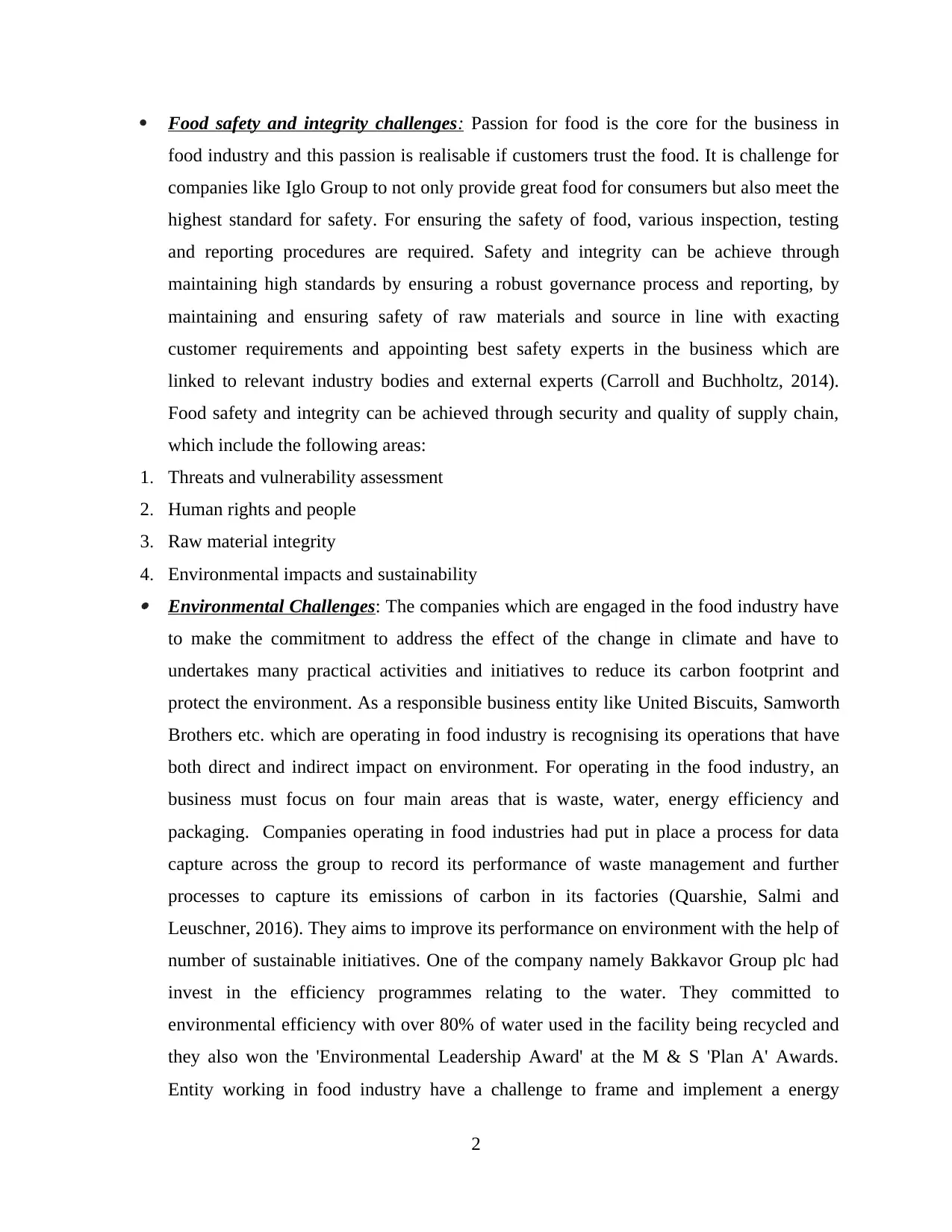
Food safety and integrity challenges: Passion for food is the core for the business in
food industry and this passion is realisable if customers trust the food. It is challenge for
companies like Iglo Group to not only provide great food for consumers but also meet the
highest standard for safety. For ensuring the safety of food, various inspection, testing
and reporting procedures are required. Safety and integrity can be achieve through
maintaining high standards by ensuring a robust governance process and reporting, by
maintaining and ensuring safety of raw materials and source in line with exacting
customer requirements and appointing best safety experts in the business which are
linked to relevant industry bodies and external experts (Carroll and Buchholtz, 2014).
Food safety and integrity can be achieved through security and quality of supply chain,
which include the following areas:
1. Threats and vulnerability assessment
2. Human rights and people
3. Raw material integrity
4. Environmental impacts and sustainability Environmental Challenges: The companies which are engaged in the food industry have
to make the commitment to address the effect of the change in climate and have to
undertakes many practical activities and initiatives to reduce its carbon footprint and
protect the environment. As a responsible business entity like United Biscuits, Samworth
Brothers etc. which are operating in food industry is recognising its operations that have
both direct and indirect impact on environment. For operating in the food industry, an
business must focus on four main areas that is waste, water, energy efficiency and
packaging. Companies operating in food industries had put in place a process for data
capture across the group to record its performance of waste management and further
processes to capture its emissions of carbon in its factories (Quarshie, Salmi and
Leuschner, 2016). They aims to improve its performance on environment with the help of
number of sustainable initiatives. One of the company namely Bakkavor Group plc had
invest in the efficiency programmes relating to the water. They committed to
environmental efficiency with over 80% of water used in the facility being recycled and
they also won the 'Environmental Leadership Award' at the M & S 'Plan A' Awards.
Entity working in food industry have a challenge to frame and implement a energy
2
food industry and this passion is realisable if customers trust the food. It is challenge for
companies like Iglo Group to not only provide great food for consumers but also meet the
highest standard for safety. For ensuring the safety of food, various inspection, testing
and reporting procedures are required. Safety and integrity can be achieve through
maintaining high standards by ensuring a robust governance process and reporting, by
maintaining and ensuring safety of raw materials and source in line with exacting
customer requirements and appointing best safety experts in the business which are
linked to relevant industry bodies and external experts (Carroll and Buchholtz, 2014).
Food safety and integrity can be achieved through security and quality of supply chain,
which include the following areas:
1. Threats and vulnerability assessment
2. Human rights and people
3. Raw material integrity
4. Environmental impacts and sustainability Environmental Challenges: The companies which are engaged in the food industry have
to make the commitment to address the effect of the change in climate and have to
undertakes many practical activities and initiatives to reduce its carbon footprint and
protect the environment. As a responsible business entity like United Biscuits, Samworth
Brothers etc. which are operating in food industry is recognising its operations that have
both direct and indirect impact on environment. For operating in the food industry, an
business must focus on four main areas that is waste, water, energy efficiency and
packaging. Companies operating in food industries had put in place a process for data
capture across the group to record its performance of waste management and further
processes to capture its emissions of carbon in its factories (Quarshie, Salmi and
Leuschner, 2016). They aims to improve its performance on environment with the help of
number of sustainable initiatives. One of the company namely Bakkavor Group plc had
invest in the efficiency programmes relating to the water. They committed to
environmental efficiency with over 80% of water used in the facility being recycled and
they also won the 'Environmental Leadership Award' at the M & S 'Plan A' Awards.
Entity working in food industry have a challenge to frame and implement a energy
2
Paraphrase This Document
Need a fresh take? Get an instant paraphrase of this document with our AI Paraphraser
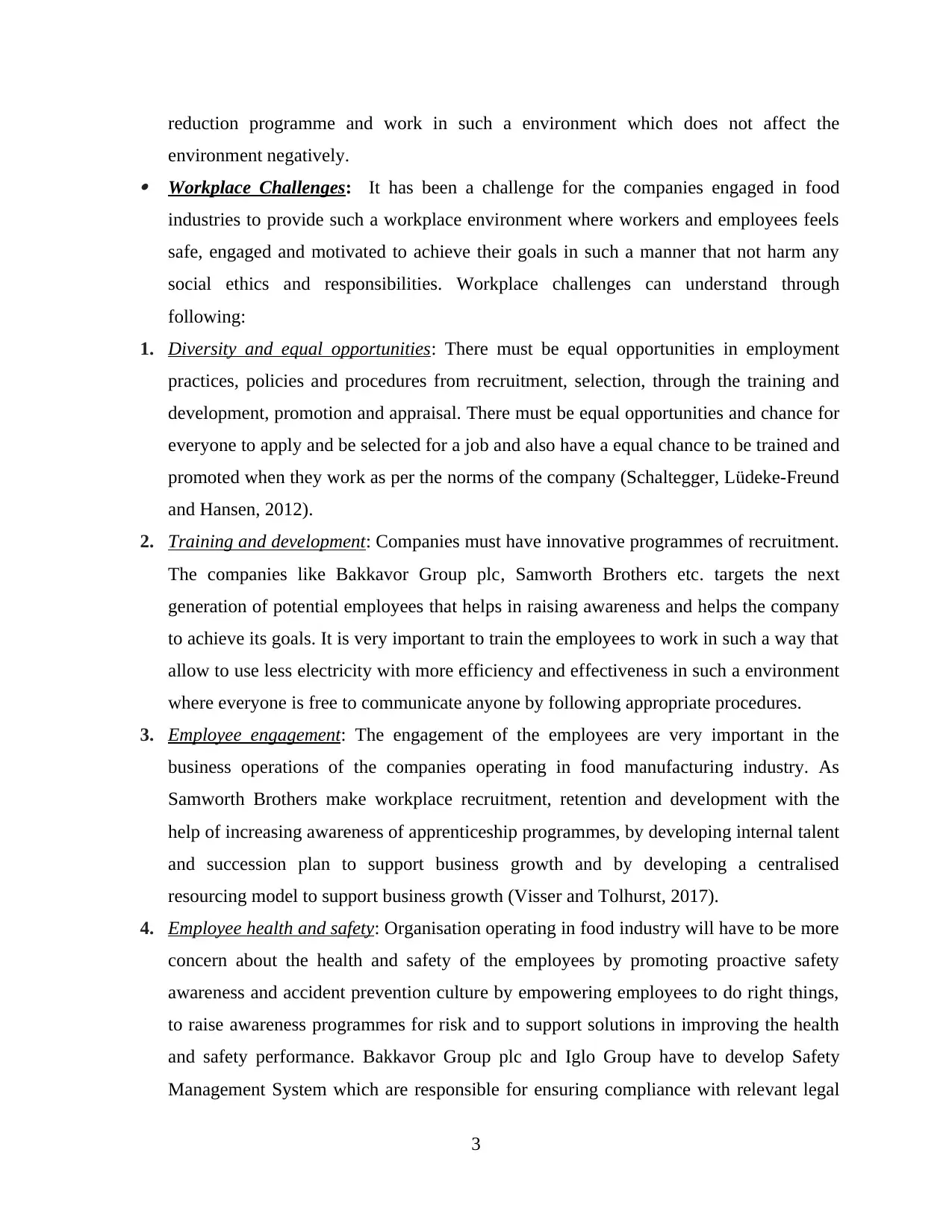
reduction programme and work in such a environment which does not affect the
environment negatively. Workplace Challenges: It has been a challenge for the companies engaged in food
industries to provide such a workplace environment where workers and employees feels
safe, engaged and motivated to achieve their goals in such a manner that not harm any
social ethics and responsibilities. Workplace challenges can understand through
following:
1. Diversity and equal opportunities: There must be equal opportunities in employment
practices, policies and procedures from recruitment, selection, through the training and
development, promotion and appraisal. There must be equal opportunities and chance for
everyone to apply and be selected for a job and also have a equal chance to be trained and
promoted when they work as per the norms of the company (Schaltegger, Lüdeke-Freund
and Hansen, 2012).
2. Training and development: Companies must have innovative programmes of recruitment.
The companies like Bakkavor Group plc, Samworth Brothers etc. targets the next
generation of potential employees that helps in raising awareness and helps the company
to achieve its goals. It is very important to train the employees to work in such a way that
allow to use less electricity with more efficiency and effectiveness in such a environment
where everyone is free to communicate anyone by following appropriate procedures.
3. Employee engagement: The engagement of the employees are very important in the
business operations of the companies operating in food manufacturing industry. As
Samworth Brothers make workplace recruitment, retention and development with the
help of increasing awareness of apprenticeship programmes, by developing internal talent
and succession plan to support business growth and by developing a centralised
resourcing model to support business growth (Visser and Tolhurst, 2017).
4. Employee health and safety: Organisation operating in food industry will have to be more
concern about the health and safety of the employees by promoting proactive safety
awareness and accident prevention culture by empowering employees to do right things,
to raise awareness programmes for risk and to support solutions in improving the health
and safety performance. Bakkavor Group plc and Iglo Group have to develop Safety
Management System which are responsible for ensuring compliance with relevant legal
3
environment negatively. Workplace Challenges: It has been a challenge for the companies engaged in food
industries to provide such a workplace environment where workers and employees feels
safe, engaged and motivated to achieve their goals in such a manner that not harm any
social ethics and responsibilities. Workplace challenges can understand through
following:
1. Diversity and equal opportunities: There must be equal opportunities in employment
practices, policies and procedures from recruitment, selection, through the training and
development, promotion and appraisal. There must be equal opportunities and chance for
everyone to apply and be selected for a job and also have a equal chance to be trained and
promoted when they work as per the norms of the company (Schaltegger, Lüdeke-Freund
and Hansen, 2012).
2. Training and development: Companies must have innovative programmes of recruitment.
The companies like Bakkavor Group plc, Samworth Brothers etc. targets the next
generation of potential employees that helps in raising awareness and helps the company
to achieve its goals. It is very important to train the employees to work in such a way that
allow to use less electricity with more efficiency and effectiveness in such a environment
where everyone is free to communicate anyone by following appropriate procedures.
3. Employee engagement: The engagement of the employees are very important in the
business operations of the companies operating in food manufacturing industry. As
Samworth Brothers make workplace recruitment, retention and development with the
help of increasing awareness of apprenticeship programmes, by developing internal talent
and succession plan to support business growth and by developing a centralised
resourcing model to support business growth (Visser and Tolhurst, 2017).
4. Employee health and safety: Organisation operating in food industry will have to be more
concern about the health and safety of the employees by promoting proactive safety
awareness and accident prevention culture by empowering employees to do right things,
to raise awareness programmes for risk and to support solutions in improving the health
and safety performance. Bakkavor Group plc and Iglo Group have to develop Safety
Management System which are responsible for ensuring compliance with relevant legal
3
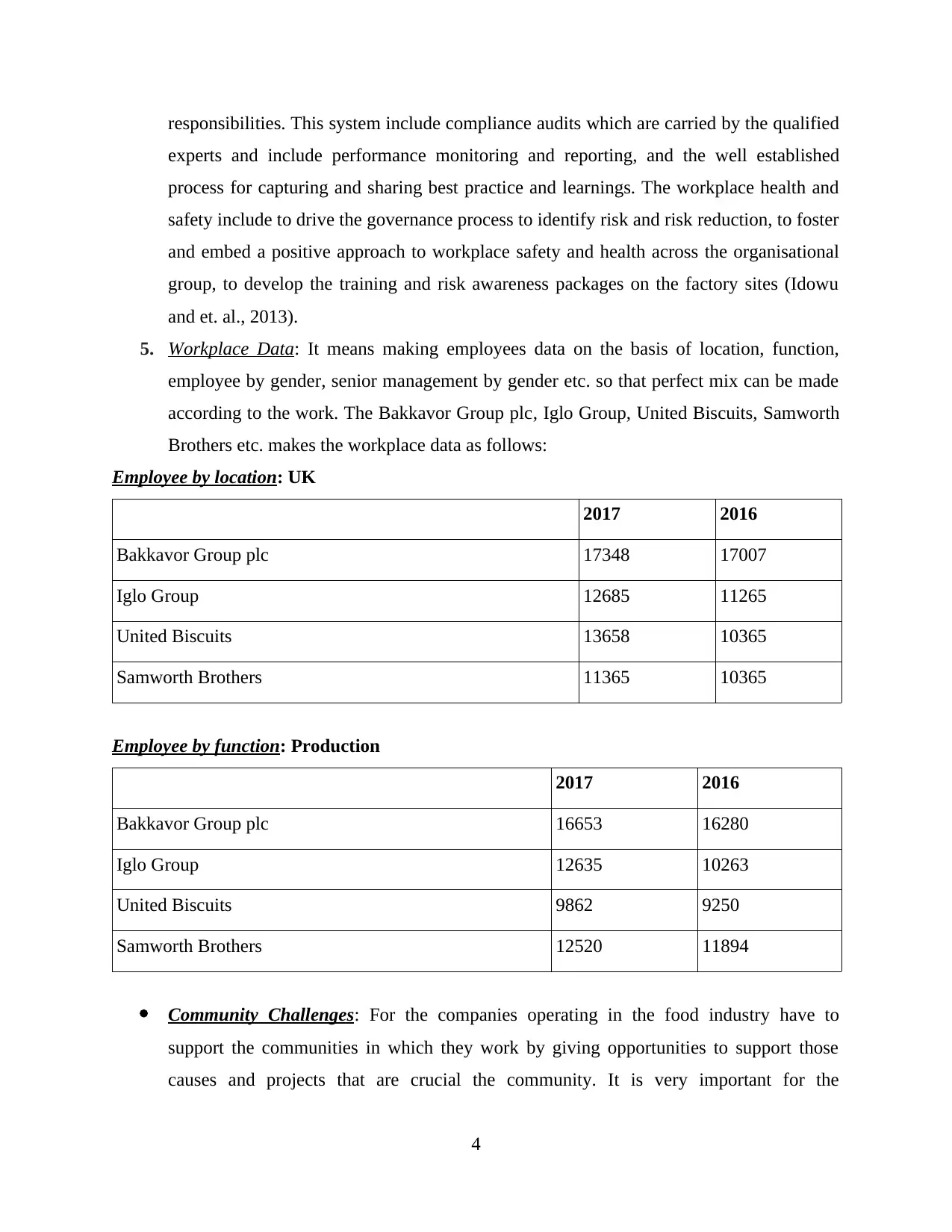
responsibilities. This system include compliance audits which are carried by the qualified
experts and include performance monitoring and reporting, and the well established
process for capturing and sharing best practice and learnings. The workplace health and
safety include to drive the governance process to identify risk and risk reduction, to foster
and embed a positive approach to workplace safety and health across the organisational
group, to develop the training and risk awareness packages on the factory sites (Idowu
and et. al., 2013).
5. Workplace Data: It means making employees data on the basis of location, function,
employee by gender, senior management by gender etc. so that perfect mix can be made
according to the work. The Bakkavor Group plc, Iglo Group, United Biscuits, Samworth
Brothers etc. makes the workplace data as follows:
Employee by location: UK
2017 2016
Bakkavor Group plc 17348 17007
Iglo Group 12685 11265
United Biscuits 13658 10365
Samworth Brothers 11365 10365
Employee by function: Production
2017 2016
Bakkavor Group plc 16653 16280
Iglo Group 12635 10263
United Biscuits 9862 9250
Samworth Brothers 12520 11894
Community Challenges: For the companies operating in the food industry have to
support the communities in which they work by giving opportunities to support those
causes and projects that are crucial the community. It is very important for the
4
experts and include performance monitoring and reporting, and the well established
process for capturing and sharing best practice and learnings. The workplace health and
safety include to drive the governance process to identify risk and risk reduction, to foster
and embed a positive approach to workplace safety and health across the organisational
group, to develop the training and risk awareness packages on the factory sites (Idowu
and et. al., 2013).
5. Workplace Data: It means making employees data on the basis of location, function,
employee by gender, senior management by gender etc. so that perfect mix can be made
according to the work. The Bakkavor Group plc, Iglo Group, United Biscuits, Samworth
Brothers etc. makes the workplace data as follows:
Employee by location: UK
2017 2016
Bakkavor Group plc 17348 17007
Iglo Group 12685 11265
United Biscuits 13658 10365
Samworth Brothers 11365 10365
Employee by function: Production
2017 2016
Bakkavor Group plc 16653 16280
Iglo Group 12635 10263
United Biscuits 9862 9250
Samworth Brothers 12520 11894
Community Challenges: For the companies operating in the food industry have to
support the communities in which they work by giving opportunities to support those
causes and projects that are crucial the community. It is very important for the
4
⊘ This is a preview!⊘
Do you want full access?
Subscribe today to unlock all pages.

Trusted by 1+ million students worldwide
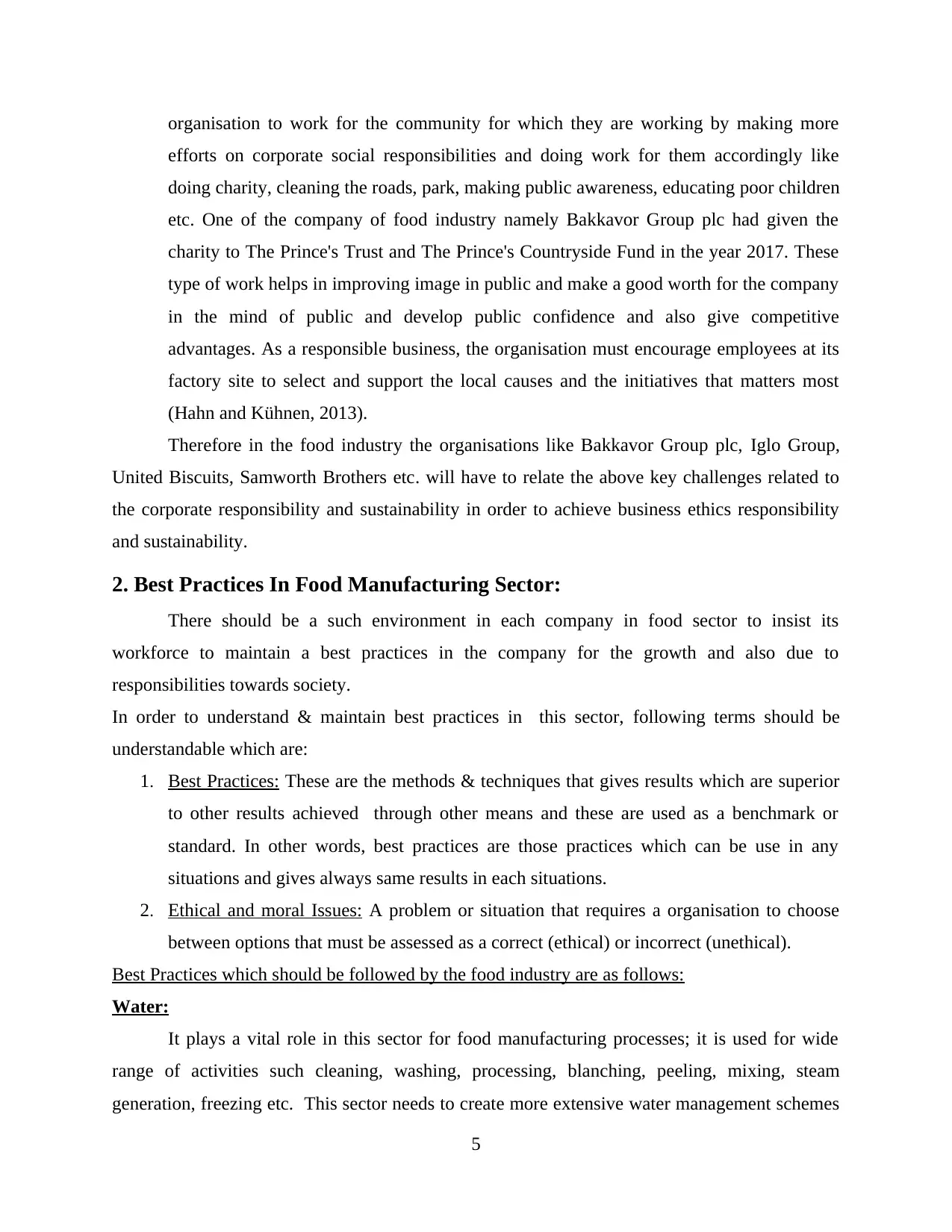
organisation to work for the community for which they are working by making more
efforts on corporate social responsibilities and doing work for them accordingly like
doing charity, cleaning the roads, park, making public awareness, educating poor children
etc. One of the company of food industry namely Bakkavor Group plc had given the
charity to The Prince's Trust and The Prince's Countryside Fund in the year 2017. These
type of work helps in improving image in public and make a good worth for the company
in the mind of public and develop public confidence and also give competitive
advantages. As a responsible business, the organisation must encourage employees at its
factory site to select and support the local causes and the initiatives that matters most
(Hahn and Kühnen, 2013).
Therefore in the food industry the organisations like Bakkavor Group plc, Iglo Group,
United Biscuits, Samworth Brothers etc. will have to relate the above key challenges related to
the corporate responsibility and sustainability in order to achieve business ethics responsibility
and sustainability.
2. Best Practices In Food Manufacturing Sector:
There should be a such environment in each company in food sector to insist its
workforce to maintain a best practices in the company for the growth and also due to
responsibilities towards society.
In order to understand & maintain best practices in this sector, following terms should be
understandable which are:
1. Best Practices: These are the methods & techniques that gives results which are superior
to other results achieved through other means and these are used as a benchmark or
standard. In other words, best practices are those practices which can be use in any
situations and gives always same results in each situations.
2. Ethical and moral Issues: A problem or situation that requires a organisation to choose
between options that must be assessed as a correct (ethical) or incorrect (unethical).
Best Practices which should be followed by the food industry are as follows:
Water:
It plays a vital role in this sector for food manufacturing processes; it is used for wide
range of activities such cleaning, washing, processing, blanching, peeling, mixing, steam
generation, freezing etc. This sector needs to create more extensive water management schemes
5
efforts on corporate social responsibilities and doing work for them accordingly like
doing charity, cleaning the roads, park, making public awareness, educating poor children
etc. One of the company of food industry namely Bakkavor Group plc had given the
charity to The Prince's Trust and The Prince's Countryside Fund in the year 2017. These
type of work helps in improving image in public and make a good worth for the company
in the mind of public and develop public confidence and also give competitive
advantages. As a responsible business, the organisation must encourage employees at its
factory site to select and support the local causes and the initiatives that matters most
(Hahn and Kühnen, 2013).
Therefore in the food industry the organisations like Bakkavor Group plc, Iglo Group,
United Biscuits, Samworth Brothers etc. will have to relate the above key challenges related to
the corporate responsibility and sustainability in order to achieve business ethics responsibility
and sustainability.
2. Best Practices In Food Manufacturing Sector:
There should be a such environment in each company in food sector to insist its
workforce to maintain a best practices in the company for the growth and also due to
responsibilities towards society.
In order to understand & maintain best practices in this sector, following terms should be
understandable which are:
1. Best Practices: These are the methods & techniques that gives results which are superior
to other results achieved through other means and these are used as a benchmark or
standard. In other words, best practices are those practices which can be use in any
situations and gives always same results in each situations.
2. Ethical and moral Issues: A problem or situation that requires a organisation to choose
between options that must be assessed as a correct (ethical) or incorrect (unethical).
Best Practices which should be followed by the food industry are as follows:
Water:
It plays a vital role in this sector for food manufacturing processes; it is used for wide
range of activities such cleaning, washing, processing, blanching, peeling, mixing, steam
generation, freezing etc. This sector needs to create more extensive water management schemes
5
Paraphrase This Document
Need a fresh take? Get an instant paraphrase of this document with our AI Paraphraser
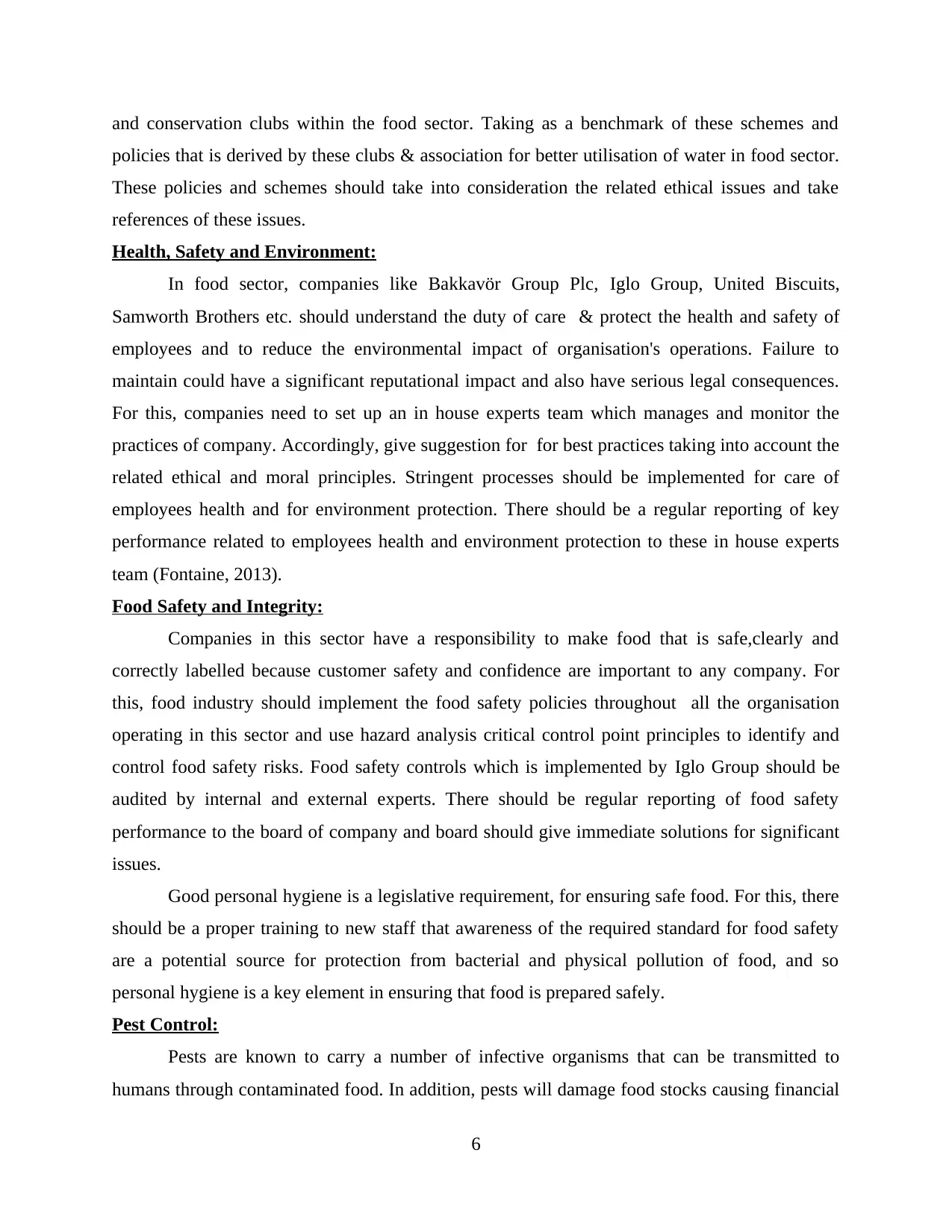
and conservation clubs within the food sector. Taking as a benchmark of these schemes and
policies that is derived by these clubs & association for better utilisation of water in food sector.
These policies and schemes should take into consideration the related ethical issues and take
references of these issues.
Health, Safety and Environment:
In food sector, companies like Bakkavör Group Plc, Iglo Group, United Biscuits,
Samworth Brothers etc. should understand the duty of care & protect the health and safety of
employees and to reduce the environmental impact of organisation's operations. Failure to
maintain could have a significant reputational impact and also have serious legal consequences.
For this, companies need to set up an in house experts team which manages and monitor the
practices of company. Accordingly, give suggestion for for best practices taking into account the
related ethical and moral principles. Stringent processes should be implemented for care of
employees health and for environment protection. There should be a regular reporting of key
performance related to employees health and environment protection to these in house experts
team (Fontaine, 2013).
Food Safety and Integrity:
Companies in this sector have a responsibility to make food that is safe,clearly and
correctly labelled because customer safety and confidence are important to any company. For
this, food industry should implement the food safety policies throughout all the organisation
operating in this sector and use hazard analysis critical control point principles to identify and
control food safety risks. Food safety controls which is implemented by Iglo Group should be
audited by internal and external experts. There should be regular reporting of food safety
performance to the board of company and board should give immediate solutions for significant
issues.
Good personal hygiene is a legislative requirement, for ensuring safe food. For this, there
should be a proper training to new staff that awareness of the required standard for food safety
are a potential source for protection from bacterial and physical pollution of food, and so
personal hygiene is a key element in ensuring that food is prepared safely.
Pest Control:
Pests are known to carry a number of infective organisms that can be transmitted to
humans through contaminated food. In addition, pests will damage food stocks causing financial
6
policies that is derived by these clubs & association for better utilisation of water in food sector.
These policies and schemes should take into consideration the related ethical issues and take
references of these issues.
Health, Safety and Environment:
In food sector, companies like Bakkavör Group Plc, Iglo Group, United Biscuits,
Samworth Brothers etc. should understand the duty of care & protect the health and safety of
employees and to reduce the environmental impact of organisation's operations. Failure to
maintain could have a significant reputational impact and also have serious legal consequences.
For this, companies need to set up an in house experts team which manages and monitor the
practices of company. Accordingly, give suggestion for for best practices taking into account the
related ethical and moral principles. Stringent processes should be implemented for care of
employees health and for environment protection. There should be a regular reporting of key
performance related to employees health and environment protection to these in house experts
team (Fontaine, 2013).
Food Safety and Integrity:
Companies in this sector have a responsibility to make food that is safe,clearly and
correctly labelled because customer safety and confidence are important to any company. For
this, food industry should implement the food safety policies throughout all the organisation
operating in this sector and use hazard analysis critical control point principles to identify and
control food safety risks. Food safety controls which is implemented by Iglo Group should be
audited by internal and external experts. There should be regular reporting of food safety
performance to the board of company and board should give immediate solutions for significant
issues.
Good personal hygiene is a legislative requirement, for ensuring safe food. For this, there
should be a proper training to new staff that awareness of the required standard for food safety
are a potential source for protection from bacterial and physical pollution of food, and so
personal hygiene is a key element in ensuring that food is prepared safely.
Pest Control:
Pests are known to carry a number of infective organisms that can be transmitted to
humans through contaminated food. In addition, pests will damage food stocks causing financial
6
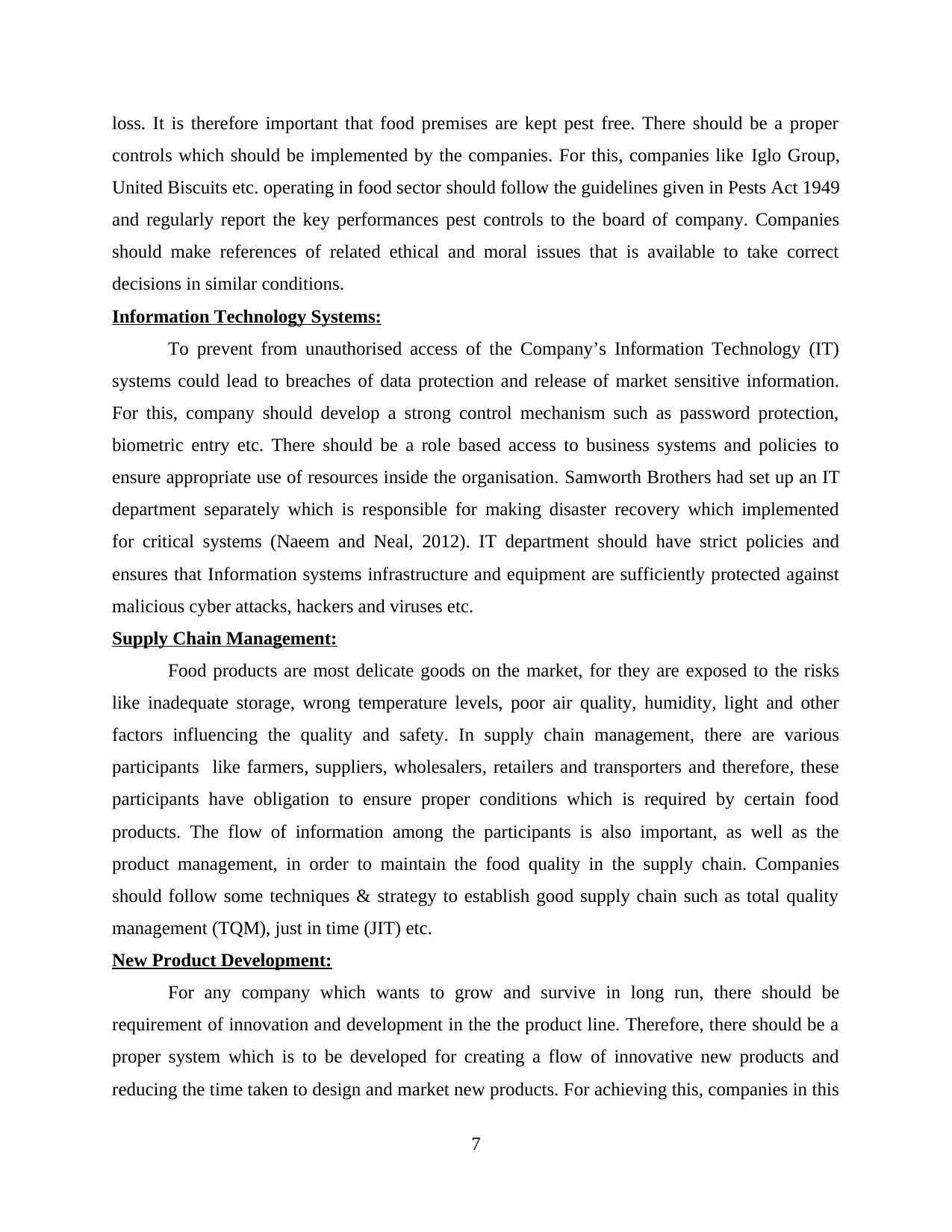
loss. It is therefore important that food premises are kept pest free. There should be a proper
controls which should be implemented by the companies. For this, companies like Iglo Group,
United Biscuits etc. operating in food sector should follow the guidelines given in Pests Act 1949
and regularly report the key performances pest controls to the board of company. Companies
should make references of related ethical and moral issues that is available to take correct
decisions in similar conditions.
Information Technology Systems:
To prevent from unauthorised access of the Company’s Information Technology (IT)
systems could lead to breaches of data protection and release of market sensitive information.
For this, company should develop a strong control mechanism such as password protection,
biometric entry etc. There should be a role based access to business systems and policies to
ensure appropriate use of resources inside the organisation. Samworth Brothers had set up an IT
department separately which is responsible for making disaster recovery which implemented
for critical systems (Naeem and Neal, 2012). IT department should have strict policies and
ensures that Information systems infrastructure and equipment are sufficiently protected against
malicious cyber attacks, hackers and viruses etc.
Supply Chain Management:
Food products are most delicate goods on the market, for they are exposed to the risks
like inadequate storage, wrong temperature levels, poor air quality, humidity, light and other
factors influencing the quality and safety. In supply chain management, there are various
participants like farmers, suppliers, wholesalers, retailers and transporters and therefore, these
participants have obligation to ensure proper conditions which is required by certain food
products. The flow of information among the participants is also important, as well as the
product management, in order to maintain the food quality in the supply chain. Companies
should follow some techniques & strategy to establish good supply chain such as total quality
management (TQM), just in time (JIT) etc.
New Product Development:
For any company which wants to grow and survive in long run, there should be
requirement of innovation and development in the the product line. Therefore, there should be a
proper system which is to be developed for creating a flow of innovative new products and
reducing the time taken to design and market new products. For achieving this, companies in this
7
controls which should be implemented by the companies. For this, companies like Iglo Group,
United Biscuits etc. operating in food sector should follow the guidelines given in Pests Act 1949
and regularly report the key performances pest controls to the board of company. Companies
should make references of related ethical and moral issues that is available to take correct
decisions in similar conditions.
Information Technology Systems:
To prevent from unauthorised access of the Company’s Information Technology (IT)
systems could lead to breaches of data protection and release of market sensitive information.
For this, company should develop a strong control mechanism such as password protection,
biometric entry etc. There should be a role based access to business systems and policies to
ensure appropriate use of resources inside the organisation. Samworth Brothers had set up an IT
department separately which is responsible for making disaster recovery which implemented
for critical systems (Naeem and Neal, 2012). IT department should have strict policies and
ensures that Information systems infrastructure and equipment are sufficiently protected against
malicious cyber attacks, hackers and viruses etc.
Supply Chain Management:
Food products are most delicate goods on the market, for they are exposed to the risks
like inadequate storage, wrong temperature levels, poor air quality, humidity, light and other
factors influencing the quality and safety. In supply chain management, there are various
participants like farmers, suppliers, wholesalers, retailers and transporters and therefore, these
participants have obligation to ensure proper conditions which is required by certain food
products. The flow of information among the participants is also important, as well as the
product management, in order to maintain the food quality in the supply chain. Companies
should follow some techniques & strategy to establish good supply chain such as total quality
management (TQM), just in time (JIT) etc.
New Product Development:
For any company which wants to grow and survive in long run, there should be
requirement of innovation and development in the the product line. Therefore, there should be a
proper system which is to be developed for creating a flow of innovative new products and
reducing the time taken to design and market new products. For achieving this, companies in this
7
⊘ This is a preview!⊘
Do you want full access?
Subscribe today to unlock all pages.

Trusted by 1+ million students worldwide
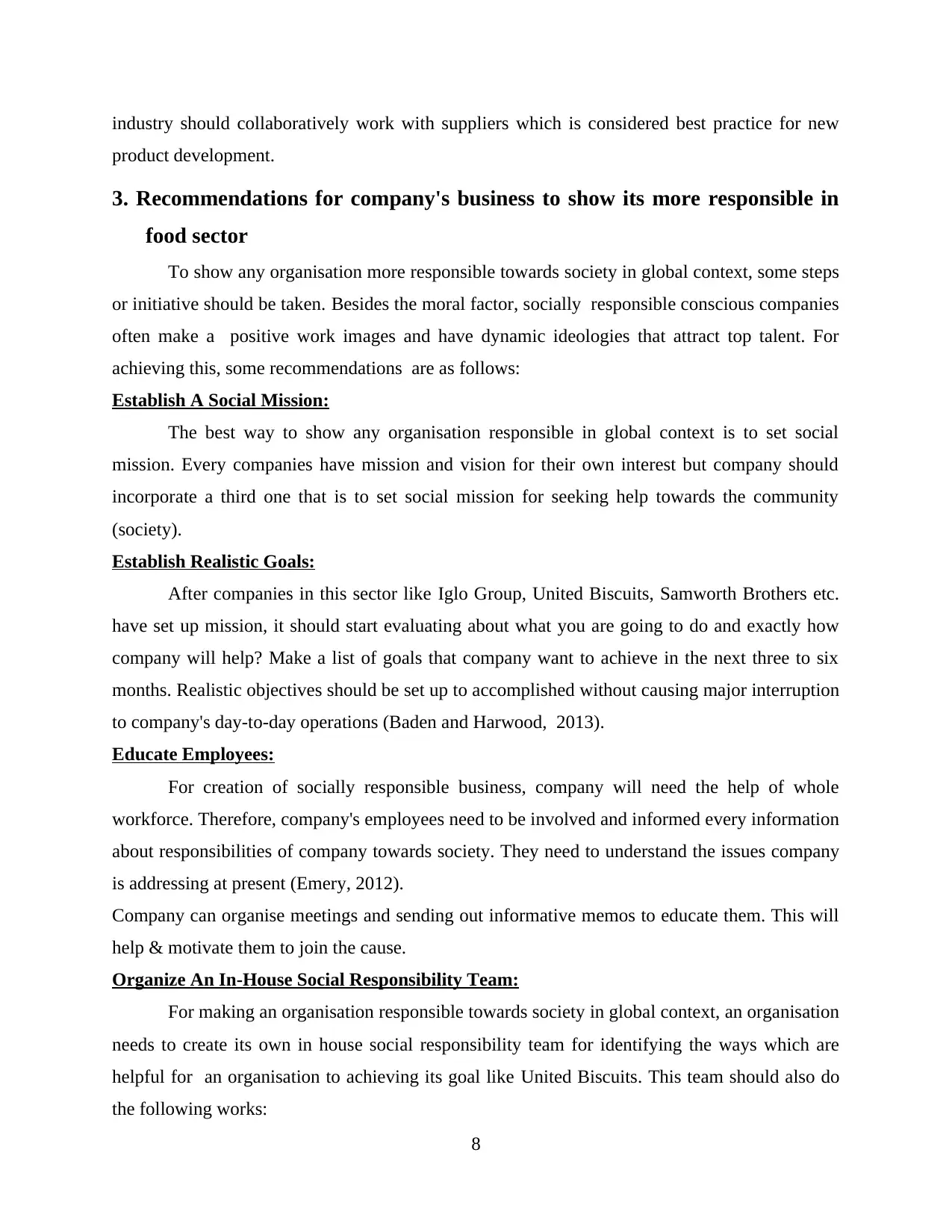
industry should collaboratively work with suppliers which is considered best practice for new
product development.
3. Recommendations for company's business to show its more responsible in
food sector
To show any organisation more responsible towards society in global context, some steps
or initiative should be taken. Besides the moral factor, socially responsible conscious companies
often make a positive work images and have dynamic ideologies that attract top talent. For
achieving this, some recommendations are as follows:
Establish A Social Mission:
The best way to show any organisation responsible in global context is to set social
mission. Every companies have mission and vision for their own interest but company should
incorporate a third one that is to set social mission for seeking help towards the community
(society).
Establish Realistic Goals:
After companies in this sector like Iglo Group, United Biscuits, Samworth Brothers etc.
have set up mission, it should start evaluating about what you are going to do and exactly how
company will help? Make a list of goals that company want to achieve in the next three to six
months. Realistic objectives should be set up to accomplished without causing major interruption
to company's day-to-day operations (Baden and Harwood, 2013).
Educate Employees:
For creation of socially responsible business, company will need the help of whole
workforce. Therefore, company's employees need to be involved and informed every information
about responsibilities of company towards society. They need to understand the issues company
is addressing at present (Emery, 2012).
Company can organise meetings and sending out informative memos to educate them. This will
help & motivate them to join the cause.
Organize An In-House Social Responsibility Team:
For making an organisation responsible towards society in global context, an organisation
needs to create its own in house social responsibility team for identifying the ways which are
helpful for an organisation to achieving its goal like United Biscuits. This team should also do
the following works:
8
product development.
3. Recommendations for company's business to show its more responsible in
food sector
To show any organisation more responsible towards society in global context, some steps
or initiative should be taken. Besides the moral factor, socially responsible conscious companies
often make a positive work images and have dynamic ideologies that attract top talent. For
achieving this, some recommendations are as follows:
Establish A Social Mission:
The best way to show any organisation responsible in global context is to set social
mission. Every companies have mission and vision for their own interest but company should
incorporate a third one that is to set social mission for seeking help towards the community
(society).
Establish Realistic Goals:
After companies in this sector like Iglo Group, United Biscuits, Samworth Brothers etc.
have set up mission, it should start evaluating about what you are going to do and exactly how
company will help? Make a list of goals that company want to achieve in the next three to six
months. Realistic objectives should be set up to accomplished without causing major interruption
to company's day-to-day operations (Baden and Harwood, 2013).
Educate Employees:
For creation of socially responsible business, company will need the help of whole
workforce. Therefore, company's employees need to be involved and informed every information
about responsibilities of company towards society. They need to understand the issues company
is addressing at present (Emery, 2012).
Company can organise meetings and sending out informative memos to educate them. This will
help & motivate them to join the cause.
Organize An In-House Social Responsibility Team:
For making an organisation responsible towards society in global context, an organisation
needs to create its own in house social responsibility team for identifying the ways which are
helpful for an organisation to achieving its goal like United Biscuits. This team should also do
the following works:
8
Paraphrase This Document
Need a fresh take? Get an instant paraphrase of this document with our AI Paraphraser
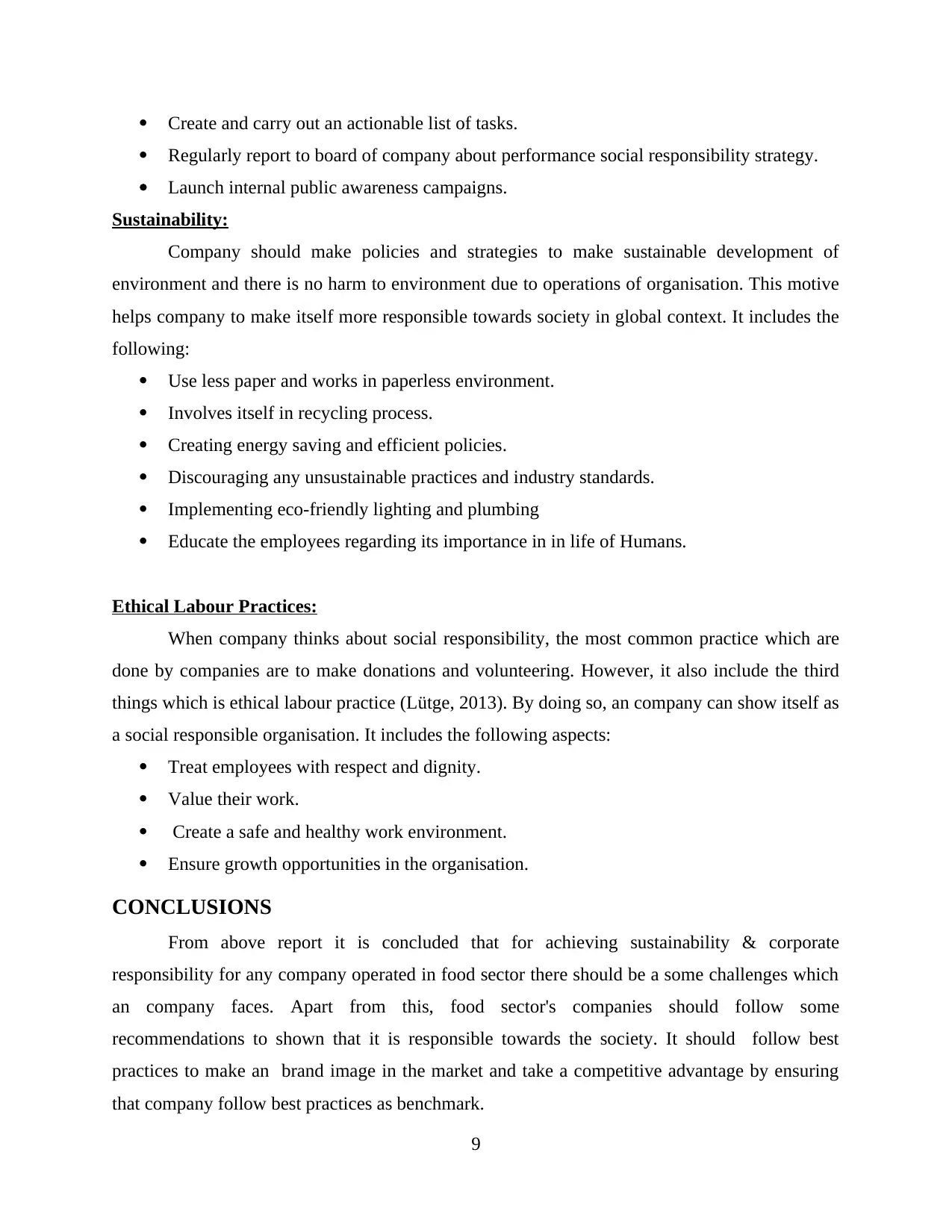
Create and carry out an actionable list of tasks.
Regularly report to board of company about performance social responsibility strategy.
Launch internal public awareness campaigns.
Sustainability:
Company should make policies and strategies to make sustainable development of
environment and there is no harm to environment due to operations of organisation. This motive
helps company to make itself more responsible towards society in global context. It includes the
following:
Use less paper and works in paperless environment.
Involves itself in recycling process.
Creating energy saving and efficient policies.
Discouraging any unsustainable practices and industry standards.
Implementing eco-friendly lighting and plumbing
Educate the employees regarding its importance in in life of Humans.
Ethical Labour Practices:
When company thinks about social responsibility, the most common practice which are
done by companies are to make donations and volunteering. However, it also include the third
things which is ethical labour practice (Lütge, 2013). By doing so, an company can show itself as
a social responsible organisation. It includes the following aspects:
Treat employees with respect and dignity.
Value their work.
Create a safe and healthy work environment.
Ensure growth opportunities in the organisation.
CONCLUSIONS
From above report it is concluded that for achieving sustainability & corporate
responsibility for any company operated in food sector there should be a some challenges which
an company faces. Apart from this, food sector's companies should follow some
recommendations to shown that it is responsible towards the society. It should follow best
practices to make an brand image in the market and take a competitive advantage by ensuring
that company follow best practices as benchmark.
9
Regularly report to board of company about performance social responsibility strategy.
Launch internal public awareness campaigns.
Sustainability:
Company should make policies and strategies to make sustainable development of
environment and there is no harm to environment due to operations of organisation. This motive
helps company to make itself more responsible towards society in global context. It includes the
following:
Use less paper and works in paperless environment.
Involves itself in recycling process.
Creating energy saving and efficient policies.
Discouraging any unsustainable practices and industry standards.
Implementing eco-friendly lighting and plumbing
Educate the employees regarding its importance in in life of Humans.
Ethical Labour Practices:
When company thinks about social responsibility, the most common practice which are
done by companies are to make donations and volunteering. However, it also include the third
things which is ethical labour practice (Lütge, 2013). By doing so, an company can show itself as
a social responsible organisation. It includes the following aspects:
Treat employees with respect and dignity.
Value their work.
Create a safe and healthy work environment.
Ensure growth opportunities in the organisation.
CONCLUSIONS
From above report it is concluded that for achieving sustainability & corporate
responsibility for any company operated in food sector there should be a some challenges which
an company faces. Apart from this, food sector's companies should follow some
recommendations to shown that it is responsible towards the society. It should follow best
practices to make an brand image in the market and take a competitive advantage by ensuring
that company follow best practices as benchmark.
9
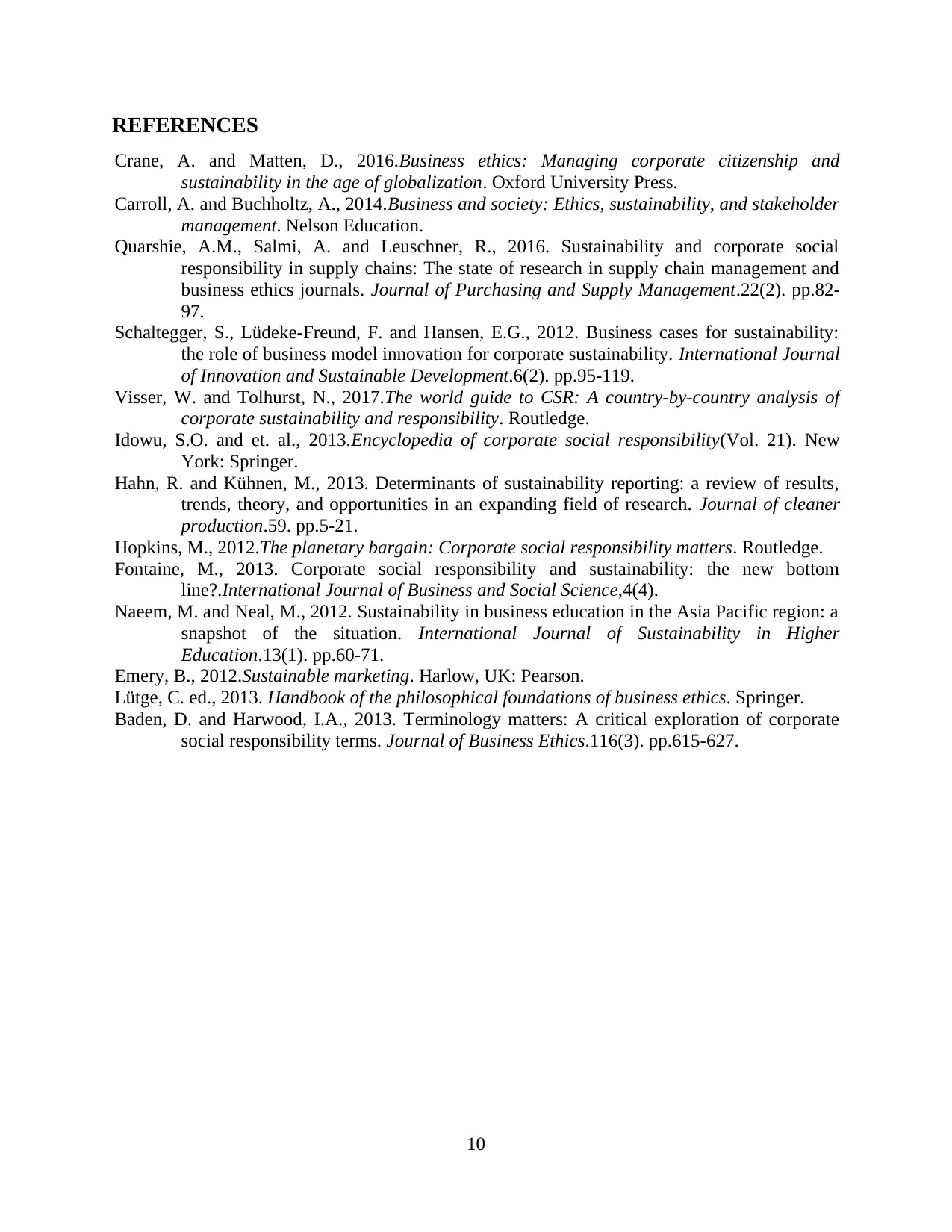
REFERENCES
Crane, A. and Matten, D., 2016.Business ethics: Managing corporate citizenship and
sustainability in the age of globalization. Oxford University Press.
Carroll, A. and Buchholtz, A., 2014.Business and society: Ethics, sustainability, and stakeholder
management. Nelson Education.
Quarshie, A.M., Salmi, A. and Leuschner, R., 2016. Sustainability and corporate social
responsibility in supply chains: The state of research in supply chain management and
business ethics journals. Journal of Purchasing and Supply Management.22(2). pp.82-
97.
Schaltegger, S., Lüdeke-Freund, F. and Hansen, E.G., 2012. Business cases for sustainability:
the role of business model innovation for corporate sustainability. International Journal
of Innovation and Sustainable Development.6(2). pp.95-119.
Visser, W. and Tolhurst, N., 2017.The world guide to CSR: A country-by-country analysis of
corporate sustainability and responsibility. Routledge.
Idowu, S.O. and et. al., 2013.Encyclopedia of corporate social responsibility(Vol. 21). New
York: Springer.
Hahn, R. and Kühnen, M., 2013. Determinants of sustainability reporting: a review of results,
trends, theory, and opportunities in an expanding field of research. Journal of cleaner
production.59. pp.5-21.
Hopkins, M., 2012.The planetary bargain: Corporate social responsibility matters. Routledge.
Fontaine, M., 2013. Corporate social responsibility and sustainability: the new bottom
line?.International Journal of Business and Social Science,4(4).
Naeem, M. and Neal, M., 2012. Sustainability in business education in the Asia Pacific region: a
snapshot of the situation. International Journal of Sustainability in Higher
Education.13(1). pp.60-71.
Emery, B., 2012.Sustainable marketing. Harlow, UK: Pearson.
Lütge, C. ed., 2013. Handbook of the philosophical foundations of business ethics. Springer.
Baden, D. and Harwood, I.A., 2013. Terminology matters: A critical exploration of corporate
social responsibility terms. Journal of Business Ethics.116(3). pp.615-627.
10
Crane, A. and Matten, D., 2016.Business ethics: Managing corporate citizenship and
sustainability in the age of globalization. Oxford University Press.
Carroll, A. and Buchholtz, A., 2014.Business and society: Ethics, sustainability, and stakeholder
management. Nelson Education.
Quarshie, A.M., Salmi, A. and Leuschner, R., 2016. Sustainability and corporate social
responsibility in supply chains: The state of research in supply chain management and
business ethics journals. Journal of Purchasing and Supply Management.22(2). pp.82-
97.
Schaltegger, S., Lüdeke-Freund, F. and Hansen, E.G., 2012. Business cases for sustainability:
the role of business model innovation for corporate sustainability. International Journal
of Innovation and Sustainable Development.6(2). pp.95-119.
Visser, W. and Tolhurst, N., 2017.The world guide to CSR: A country-by-country analysis of
corporate sustainability and responsibility. Routledge.
Idowu, S.O. and et. al., 2013.Encyclopedia of corporate social responsibility(Vol. 21). New
York: Springer.
Hahn, R. and Kühnen, M., 2013. Determinants of sustainability reporting: a review of results,
trends, theory, and opportunities in an expanding field of research. Journal of cleaner
production.59. pp.5-21.
Hopkins, M., 2012.The planetary bargain: Corporate social responsibility matters. Routledge.
Fontaine, M., 2013. Corporate social responsibility and sustainability: the new bottom
line?.International Journal of Business and Social Science,4(4).
Naeem, M. and Neal, M., 2012. Sustainability in business education in the Asia Pacific region: a
snapshot of the situation. International Journal of Sustainability in Higher
Education.13(1). pp.60-71.
Emery, B., 2012.Sustainable marketing. Harlow, UK: Pearson.
Lütge, C. ed., 2013. Handbook of the philosophical foundations of business ethics. Springer.
Baden, D. and Harwood, I.A., 2013. Terminology matters: A critical exploration of corporate
social responsibility terms. Journal of Business Ethics.116(3). pp.615-627.
10
⊘ This is a preview!⊘
Do you want full access?
Subscribe today to unlock all pages.

Trusted by 1+ million students worldwide
1 out of 12
Related Documents
Your All-in-One AI-Powered Toolkit for Academic Success.
+13062052269
info@desklib.com
Available 24*7 on WhatsApp / Email
![[object Object]](/_next/static/media/star-bottom.7253800d.svg)
Unlock your academic potential
Copyright © 2020–2026 A2Z Services. All Rights Reserved. Developed and managed by ZUCOL.





